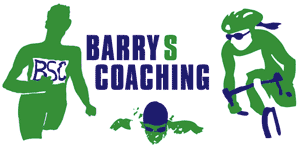Why Should I Hire a Triathlon Coach? - Part 2
by Barry Stokes, USA Triathlon Level II Triathlon Coach
- Time Management– A Barrys Coaching athlete is quoted as saying;
I know how to workout, but I don't know where, when and how to fit workouts into my life to get the best from each effort. That's what I hired you to do
. A top quality coach will ask the Coached Athlete to provide their weekly schedule of family, work and other obligations. The coach will then build the customized training plan to dove-tail into the athlete's schedule. Should the athlete's schedule change, many times the plan can be rebuilt mid-week to accommodate the changes. - Remove the
Thinking
from the Athlete and add thePerform
– A coach is paid to analyze workouts, strengthen weaknesses, make sense of the analytics, build and adjust plans – the athlete's job is to execute the plan, provide the metrics and communicate with the coach. The coachthinks and builds
allowing the athlete toexecute and perform
. - Ongoing Phone and Email Contact as Needed– A professional coach should be fully committed to personal attention in endurance and triathlon coaching. Being a full-time coach allows us to provide the attention athletes need through daily and weekly contact via face-to-face meetings, Skype, text, e-mail or phone calls. This personal communication builds relationships between the coaches and athletes that allows for free flowing and open discussion.
- Objective Feedback– Any professional full time coach will always
provide feedback. Coaches should always encourage a free and open dialog between the athlete
and coach. The athlete needs to hear from the coach and the coach needs to hear from the
athlete on information sharing, what is working in the plan, what can we as coaches do
better, etc. We call this
EBI Communication
( Even Better If). With two-way EBI communication, neither coaches nor athletes need to second guess workouts, race day strategy, etc. - Balance of Educated and Experienced Coaching– A coach should have the right balance of formal education, practical and technical experience, and athletic achievement. Having multiple coaching certifications from several different professional coaching organizations, along with many years of coaching and racing experience, will afford a professional coach the benefit of understanding the essentials of athletics and performance.
- Daily Detailed Workouts– Each athlete should receive fresh, creative, fun and laser focused daily workouts. All workouts should be posted to personalized TrainingPeaks Athlete accounts. Professional coaches will use this online software to gain your post-workout feedback and metrics which helps coaches help the Athlete improve.
- Personalized Nutritional Guidance for Performance– A professional coach should be able to provide intelligent and current advice on endurance nutrition for peak athletic performance and recovery.
- Small Details– A professional endurance and multisport coach will simplify the athlete's life by taking care of the details inside personalized training program.
- Structured Fitness and Training Program– A structured program increases the probability of a successful and injury free journey up to and including race day.
- Detailed Race Day Planning and Execution Strategies– Racing can be scary! A professional endurance and multisport coach should be there to help. Race execution starts months before the gun goes off. The coach will plan the correct taper for you and provide an individualized race day plan, including strategies and tactics to see you to your personal best for that day. A professional coach will help the athlete practice specific pacing and nutrition until it can't go wrong. But if something does go wrong we will have practiced for that as well.
